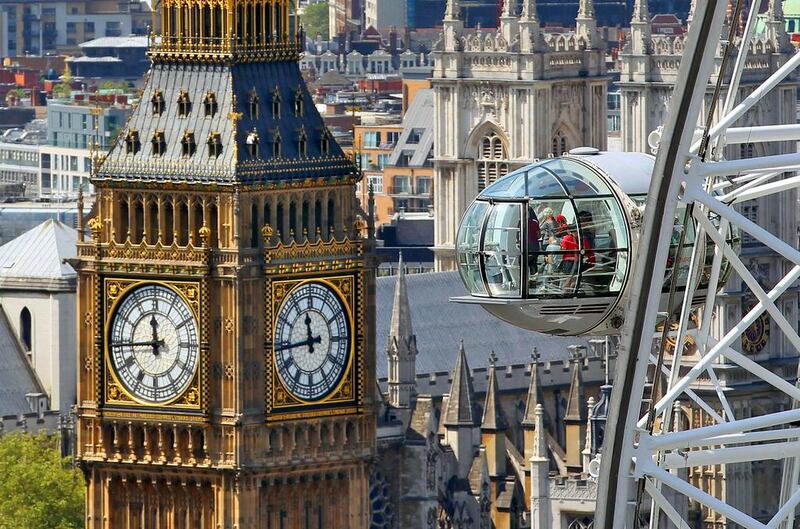Zut alors! In the travel industry’s tale of two cities, an unthinkable event has French hackles rising and British pride bursting: London has overtaken Paris as the world’s most popular city among tourists.
The British capital’s claim to supremacy depends on interpretations of different sets of statistics.
But the conclusion that London comes out on top is not the product of a wicked Anglo-Saxon media plot driven by centuries of cross-Channel rivalry. It was in the columns of the impeccably Gaullist French daily newspaper Le Figaro that news of a peacetime Fall of Paris appeared.
Boosted by the so-called “Olympic effect”, the lingering benefits of London’s successful staging of the 2012 Games, the number of visitors was said to have risen above 16 million last year.
Official figures reveal a remarkable coup for the business associated with tourism; London and Partners, the city’s promotional agency, indicated that one year after the Olympics, international visitors in the summer of last year alone spent more than £3.37 billion (Dh20.42bn) on shopping, hotels, restaurants and visits, a 5 per cent year-on-year increase.
Record crowds, Le Figaro reported, had “jostled in the halls of the British Museum, London’s leading attraction, the Tate Modern and the National Gallery. They flew in the cabins of the London Eye or walked the dark corridors of the Tower of London”.
With Paris attracting slightly fewer people – 15.9 million, although this was shown as a 2012 tally – the paper declared the city of romance and light to have been “dethroned”, Bangkok and New York taking third and fourth places, according to the French report.
Anxious not to appear triumphalist, London officials refuse to present their own achievements in the context of an ascendancy over Paris or any other city. And Paris has been quick to retort that because the only comparable figures so far available are those for 2012, the French capital remains in first place “at this stage”.
The evidence is contradictory. In 2011, MasterCard’s league table for international spending in world cities has London top on US$25.6bn with Paris and New York level on $20.3bn ahead of Bangkok, some way behind with $14.4bn. Dubai was the only Middle East city to make the top 20, with a spend of $7.8bn although Istanbul, which prides itself on its twin European and Asian identities, took 12th place with $10.2bn.
Two years later, however, the same US credit and debit card supplier used a different test – top destination cities according to the amounts spent by overnight foreign visitors – that had Bangkok top after two years of robust growth, marginally ahead of London ($15.98bn against $15.96bn), with Paris third and Dubai seventh.
The Global Cities Initiative, a joint project of JPMorgan Chase and the Brookings Institution, a thinktank based in Washington, compared four surveys of European cities’ overall economic performance in 2012. London was top on aggregate, Paris second.
Another French newspaper, Le Parisien, talked of a “war of numbers” between the two capitals and pointed out that reports of London overtaking Paris were hotly contested.
But it conceded London’s appeal had grown for a variety of reasons: the birth of a son, George, to Prince William, the second in line to the British throne; the London Eye big wheel and the Pompeii exhibition at the British Museum adding to such traditional attractions as Big Ben and Buckingham Palace.
“And besides,” the paper added, “for once the weather did no harm, good throughout the summer.” Tourism is now more economically important, it said, than the “famous City of London” financial centre operations.
Paris city hall challenged the notion of London as the world leader, saying the most recent consolidated figures, for 2012, showed Paris still ahead, with 29 million visitors of all nationalities, French included, against London’s 27.6 million. In a statement, it stressed that did not take account of Disneyland Paris or the palace of Versailles, both of which are outside the city.
Some French political figures have never quite forgiven London for beating Paris to the right to host the 2012 Olympics, even suggesting irregular lobbying tactics by Tony Blair, then the British prime minister, and officials.
The legacy of the games was emphasised by London and Partners as it welcomed the prospect that final figures for 2013 would confirm a record-breaking year.
“Hosting the Olympics has given London a massive boost on the world stage, with huge numbers of international visitors flocking to the city,” it said. The findings of Britain’s office for national statistics (ONS) showed that between July-September last year, 4.9 million people – the highest number recorded – had visited the capital.
In the first nine months of the year, the total of 12.8 million visitors from overseas represented an increase of 12 per cent compared with 2012. This indicates significantly faster growth than the 5.2 per cent claimed by Paris up to the end of October.
But London’s outspoken mayor, Boris Johnson, has for once been a model of diplomacy, dwelling only on his city’s achievements without gloating about superiority over Paris.
“With so many fascinating museums, the best theatre scene in the world, more green space than any other European city, numerous top sporting venues, a low crime rate and much else besides, it is no wonder that people from all over the globe are flocking to London in record numbers,” he said recently.
“These incredible figures prove that London is without doubt the greatest city on the planet.”
business@thenational.ae







